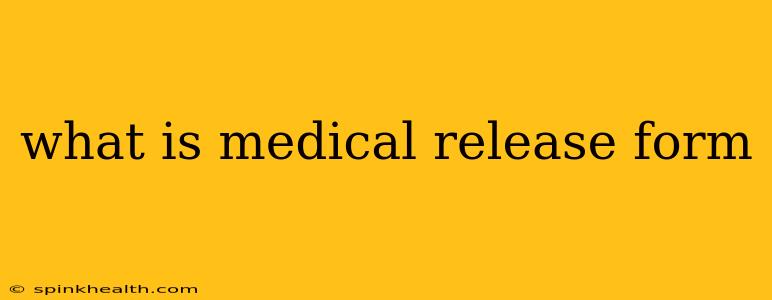Imagine this: you're at the doctor's office, feeling under the weather. After a thorough examination and some tests, your doctor has a clear diagnosis and treatment plan. But before they can share that information with, say, your insurance company or a specialist, they need your permission. That's where a medical release form comes in. It's the key that unlocks the sharing of your sensitive health information, but it's a key you control.
This isn't just a simple formality; it's a crucial legal document protecting your privacy rights under laws like HIPAA (Health Insurance Portability and Accountability Act) in the United States. This post will delve into the intricacies of medical release forms, answering your burning questions and empowering you to understand your health information rights.
What Information Does a Medical Release Form Typically Include?
A standard medical release form typically contains several key elements:
- Your personal information: This includes your full name, date of birth, address, and contact information. Accuracy is paramount here.
- Specific information to be released: The form will clearly state what specific medical information is being authorized for release. This could be your diagnosis, test results, treatment plans, or even your entire medical record. Be precise about what you want to share, and what you want to keep confidential.
- Recipient of information: The form will identify the individual or entity authorized to receive your health information. This might be an insurance company, another doctor, a lawyer, or a family member. Always double-check this information to ensure accuracy.
- Purpose of release: The form will explain why the information is needed. This could be for insurance claims processing, consultation with a specialist, or legal proceedings.
- Timeframe of authorization: Some forms specify a time limit for the release of information. If no timeframe is mentioned, the authorization may remain valid indefinitely. Pay close attention to this aspect, and if you want to limit the time period, let the office know so they can adjust the form accordingly.
- Your signature and date: This confirms your consent to release the specified information. You should always sign and date the form in the presence of a qualified personnel.
- Statement of revocation: Many forms include a clause allowing you to revoke your consent at any time. Knowing your rights here is critical, as it allows you to control the ongoing release of information.
Who Needs a Medical Release Form?
Many situations require a medical release form. Here are some common examples:
- Insurance claims: Your insurance company will need access to your medical records to process your claims.
- Referring to specialists: Your primary care physician might need to send your records to a specialist for a consultation or second opinion.
- Legal proceedings: In certain legal cases, your medical records might be subpoenaed, requiring your consent for release.
- Family members needing access: In cases where a family member is acting as your healthcare proxy, a medical release might be necessary.
Can I Refuse to Sign a Medical Release Form?
Absolutely! You have the right to refuse to sign a medical release form. Remember, your health information is confidential and you have control over who has access to it. Refusing to sign doesn't prevent you from receiving necessary medical care, but it may impact other aspects, such as insurance claim processing.
What Happens if I Sign a Medical Release Form I Regret?
Many forms contain provisions allowing you to revoke your consent. If you regret signing a form, contact the recipient of the information immediately and inform them of your decision. Then, follow up with your healthcare provider to document the revocation. Understanding this process safeguards your control over your private information.
What are the legal implications of a medical release form?
Medical release forms are legally binding documents. Signing one constitutes consent to release the specified medical information. Unauthorized release of protected health information can have serious legal repercussions for healthcare providers and others involved in the process. HIPAA violations, for example, can lead to hefty fines.
How do I ensure my privacy when signing a medical release form?
Before signing any medical release form, carefully read the entire document. Understand what information is being released, to whom it is being released, and the purpose of the release. If anything is unclear, ask for clarification. Don't hesitate to seek legal counsel if you have concerns. Your health information is precious; protect it vigilantly.
This journey into the world of medical release forms highlights their importance in safeguarding your health information while facilitating necessary communication between healthcare providers and other relevant parties. Understanding your rights and the contents of these forms is crucial for protecting your privacy and ensuring your health information is handled responsibly. Remember, your health information is your right, and you are in control.

